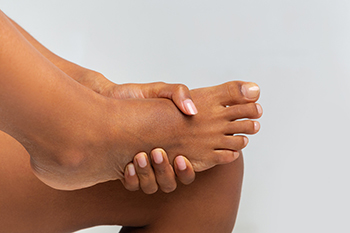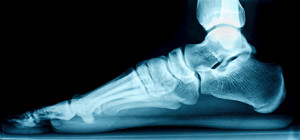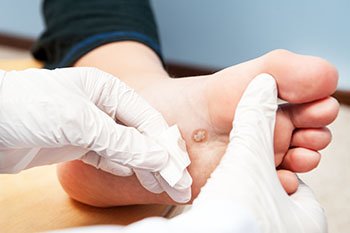Items filtered by date: March 2023
Flat Shoes and Foot Pain

Foot pain is certainly an unpleasant condition that many Americans can experience for a variety of reasons. Sometimes, foot pain is linked to the particular kind of shoe that you are wearing. While high heels are well-known for the damaging effects they can cause to your feet, other types of shoes can have adverse effects as well. Specifically, ballet flats can cause foot pain for several reasons. When ballet flats are not well padded, they can aggravate certain foot conditions, such as Achilles tendonitis and plantar fasciitis. Often, flats fail to provide the feet with sufficient arch support, which can make one more susceptible to the aforementioned foot conditions. To make your ballet flats more beneficial to the health of your feet, your podiatrist might recommend using insoles in the flats to increase arch support. If you are someone that enjoys wearing ballet flats, it is suggested that you consider contacting a podiatrist for help.
Foot Pain
Foot pain can be extremely painful and debilitating. If you have a foot pain, consult with one of our podiatrists from Summit Podiatry. Our doctors will assess your condition and provide you with quality foot and ankle treatment.
Causes
Foot pain is a very broad condition that could be caused by one or more ailments. The most common include:
- Bunions
- Hammertoes
- Plantar Fasciitis
- Bone Spurs
- Corns
- Tarsal Tunnel Syndrome
- Ingrown Toenails
- Arthritis (such as Gout, Rheumatoid, and Osteoarthritis)
- Flat Feet
- Injury (from stress fractures, broken toe, foot, ankle, Achilles tendon ruptures, and sprains)
- And more
Diagnosis
To figure out the cause of foot pain, podiatrists utilize several different methods. This can range from simple visual inspections and sensation tests to X-rays and MRI scans. Prior medical history, family medical history, and any recent physical traumatic events will all be taken into consideration for a proper diagnosis.
Treatment
Treatment depends upon the cause of the foot pain. Whether it is resting, staying off the foot, or having surgery; podiatrists have a number of treatment options available for foot pain.
If you have any questions, please feel free to contact one of our offices located in Wilmington, Whiteville, and Wallace, NC . We offer the newest diagnostic and treatment technologies for all your foot care needs.
Facts About Flat Feet

Flat feet is a fairly common foot condition. The foot appears to be flatter on the sole than it should be, as a result of a dropped arch. Many people experience discomfort from having flat feet, and other areas of the body may become affected. The majority of babies are born with flat feet, and the arch generally develops in the teenage years. This may occur in some adults, which may be for genetic reasons. Additionally, existing medical conditions may lead to developing flat feet. These can include obesity, diabetes, high blood pressure, and certain types of arthritis. It is beneficial for adults who have flat feet to rest after exercising, and it may help to wear custom made orthotics that can mimic the arch of the foot. There may be specific stretches to perform that may help the achiness of having flat feet. If you have this condition, it is suggested that you confer with a podiatrist who can help you with possible remedies for this ailment.
Flatfoot is a condition many people suffer from. If you have flat feet, contact one of our podiatrists from Summit Podiatry. Our doctors will treat your foot and ankle needs.
What Are Flat Feet?
Flatfoot is a condition in which the arch of the foot is depressed and the sole of the foot is almost completely in contact with the ground. About 20-30% of the population generally has flat feet because their arches never formed during growth.
Conditions & Problems:
Having flat feet makes it difficult to run or walk because of the stress placed on the ankles.
Alignment – The general alignment of your legs can be disrupted, because the ankles move inward which can cause major discomfort.
Knees – If you have complications with your knees, flat feet can be a contributor to arthritis in that area.
Symptoms
- Pain around the heel or arch area
- Trouble standing on the tip toe
- Swelling around the inside of the ankle
- Flat look to one or both feet
- Having your shoes feel uneven when worn
Treatment
If you are experiencing pain and stress on the foot you may weaken the posterior tibial tendon, which runs around the inside of the ankle.
If you have any questions please feel free to contact one of our offices located in Wilmington, Whiteville, and Wallace, NC . We offer the newest diagnostic and treatment technologies for all your foot and ankle needs.
Ways of Treating Plantar Warts

Warts on the skin are caused by coming in contact with a virus called the human papillomavirus, or HPV. Plantar warts are a specific type of wart that grows on the bottom of the foot. A plantar wart may start as a small round area of tough skin but may increase in size. Tiny clogged blood vessels that appear as small black dots may appear on the site of the wart. It may take as long as six months for a wart to appear after the foot is exposed to the virus. A podiatrist can examine the plantar wart and determine the best treatment options, which may include cryotherapy by liquid nitrogen, which is generally used on adults or older children. Other methods of treatment involve scraping the wart off the foot, injections of antiviral medication, and laser therapy. Treatment for plantar warts varies and unfortunately, warts can come back even after treatment is completed. If you have a plantar wart that is growing very quickly, or one that is bleeding or appears to be infected, it is strongly suggested that you seek help from a podiatrist, who is specially trained to deal with foot problems.
Plantar warts can be very uncomfortable. If you need your feet checked, contact one of our podiatrists from Summit Podiatry. Our doctors will assist you with all of your foot and ankle needs.
About Plantar Warts
Plantar warts are the result of HPV, or human papillomavirus, getting into open wounds on the feet. They are mostly found on the heels or balls of the feet.
While plantar warts are generally harmless, those experiencing excessive pain or those suffering from diabetes or a compromised immune system require immediate medical care. Plantar warts are easily diagnosed, usually through scraping off a bit of rough skin or by getting a biopsy.
Symptoms
- Lesions on the bottom of your feet, usually rough and grainy
- Hard or thick callused spots
- Wart seeds, which are small clotted blood vessels that look like little black spots
- Pain, discomfort, or tenderness of your feet when walking or standing
Treatment
- Freezing
- Electric tool removal
- Laser Treatment
- Topical Creams (prescription only)
- Over-the-counter medications
To help prevent developing plantar warts, avoid walking barefoot over abrasive surfaces that can cause cuts or wounds for HPV to get into. Avoiding direct contact with other warts, as well as not picking or rubbing existing warts, can help prevent the further spread of plantar warts. However, if you think you have developed plantar warts, speak to your podiatrist. He or she can diagnose the warts on your feet and recommend the appropriate treatment options.
If you have any questions please feel free to contact one of our offices located in Wilmington, Whiteville, and Wallace, NC . We offer the newest diagnostic and treatment technologies for all your foot and ankle needs.
Swollen Feet Is a Normal Part of Pregnancy

There is a reason many women experience swollen ankles during their pregnancy. The baby requires approximately 50 percent more fluids and blood to meet its growing needs. The medical term for swollen feet and ankles is known as edema, and it is normal during pregnancy, despite the discomfort it can bring. There are simple and effective measures that can be taken to control the amount of fluid that collects in the ankles. These can include drinking plenty of water daily and engaging in a gentle exercise program as often as possible. Walking and swimming are effective methods to keep the body moving, which can help to evenly distribute fluids that collect in the feet. It is important to wear shoes that fit well and are comfortable, in addition to reducing sodium intake. If you would like helpful tips on how to improve foot comfort while pregnant, it is suggested that you speak with a podiatrist who can address any concerns you may have.
Pregnant women with swollen feet can be treated with a variety of different methods that are readily available. For more information about other cures for swollen feet during pregnancy, consult with one of our podiatrists from Summit Podiatry. Our doctors will attend to all of your foot and ankle needs.
What Foot Problems Can Arise During Pregnancy?
One problem that can occur is overpronation, which occurs when the arch of the foot flattens and tends to roll inward. This can cause pain and discomfort in your heels while you’re walking or even just standing up, trying to support your baby.
Another problem is edema, or swelling in the extremities. This often affects the feet during pregnancy but tends to occur in the later stages.
How Can I Keep My Feet Healthy During Pregnancy?
- Wearing orthotics can provide extra support for the feet and help distribute weight evenly
- Minimize the amount of time spent walking barefoot
- Wear shoes with good arch support
- Wear shoes that allow for good circulation to the feet
- Elevate feet if you experience swelling
- Massage your feet
- Get regular, light exercise, such as walking, to promote blood circulation to the feet
If you have any questions please feel free to contact one of our offices located in Wilmington, Whiteville, and Wallace, NC . We offer the newest diagnostic and treatment technologies for all your foot and ankle needs.

